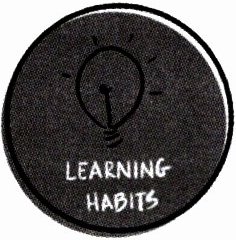C
Everyone is born with the ability to learn. But whether or not you can do this well depends on your learning habits. Research shows that successful learners have some good habits in common.
Creating an interest in what they learn Studies show that if you are interested in something, your brain is more active and it is also easier for you to pay attention to it for a long time. Good learners often connect what they need to learn with something interesting. For example, if they need to learn English and they like music or sport, they can listen to English songs or watch sports programmes in English.
Practising and learning from mistakes Good learners think about what they are good at and what they need to practise more. Remember, "Use it or lose it." Even if you learn something well, you will forget it unless you use it. "Practice makes perfect." Good learners will keep practising what they have learnt, and they are not afraid of making mistakes. Alexander Graham Bell did not invent the telephone overnight. He succeeded by trying many times and learning from his mistakes.
Developing their study skills Good learners know the best way they can study. For example, they may take notes by writing down key words or by drawing mind maps. They also look for ways to review what they have learnt. They may do this by reading their notes every day or by explaining the information to another student.
Asking questions Good learners often ask questions during or after class. Knowledge comes from questioning. Learning is a lifelong journey because every day brings something new. Everything that you learn becomes a part of you and changes you, so learn wisely and learn well.
词汇
in common (兴趣、想法等方面)相同 unless /ən’les/ conj. 除非 review /rɪ’vju:/ v. 温习,复习
句型
Even if you learn something well, you will forget it unless you use it. 即使你学得很好,如果你不用它,你也会忘记它。
even if 意为“尽管,即使”,unless 意为“除非;如果不”,两者都引导状语从句。
理解
1. What good habits do the successful learners have in common?
2. Share your good habits of learning with us.
Everyone is born with the ability to learn. But whether or not you can do this well depends on your learning habits. Research shows that successful learners have some good habits in common.

Creating an interest in what they learn Studies show that if you are interested in something, your brain is more active and it is also easier for you to pay attention to it for a long time. Good learners often connect what they need to learn with something interesting. For example, if they need to learn English and they like music or sport, they can listen to English songs or watch sports programmes in English.
Practising and learning from mistakes Good learners think about what they are good at and what they need to practise more. Remember, "Use it or lose it." Even if you learn something well, you will forget it unless you use it. "Practice makes perfect." Good learners will keep practising what they have learnt, and they are not afraid of making mistakes. Alexander Graham Bell did not invent the telephone overnight. He succeeded by trying many times and learning from his mistakes.
Developing their study skills Good learners know the best way they can study. For example, they may take notes by writing down key words or by drawing mind maps. They also look for ways to review what they have learnt. They may do this by reading their notes every day or by explaining the information to another student.
Asking questions Good learners often ask questions during or after class. Knowledge comes from questioning. Learning is a lifelong journey because every day brings something new. Everything that you learn becomes a part of you and changes you, so learn wisely and learn well.
词汇
in common (兴趣、想法等方面)相同 unless /ən’les/ conj. 除非 review /rɪ’vju:/ v. 温习,复习
句型
Even if you learn something well, you will forget it unless you use it. 即使你学得很好,如果你不用它,你也会忘记它。
even if 意为“尽管,即使”,unless 意为“除非;如果不”,两者都引导状语从句。
理解
1. What good habits do the successful learners have in common?
They often create an interest in what they learn, practise and learn from mistakes, develop their study skills, and ask questions.
2. Share your good habits of learning with us.
I often preview the lessons before class, take notes carefully in class, and review them after class. I also like to read some English articles to improve my reading ability. (答案不唯一,合理即可)
答案:【解析】:
这是一道阅读理解题,主要考查学生对文章内容的理解和概括能力。对于第一个问题,需要从文章中找出成功学习者共有的好习惯,这需要对文章整体内容进行梳理和提炼。对于第二个问题,则是要求学生结合自身实际,分享自己的良好学习习惯,考查学生的自我认知和表达能力。
【答案】:
1. They often create an interest in what they learn, practise and learn from mistakes, develop their study skills, and ask questions.
2. I often preview the lessons before class, take notes carefully in class, and review them after class. I also like to read some English articles to improve my reading ability. (答案不唯一,合理即可)
这是一道阅读理解题,主要考查学生对文章内容的理解和概括能力。对于第一个问题,需要从文章中找出成功学习者共有的好习惯,这需要对文章整体内容进行梳理和提炼。对于第二个问题,则是要求学生结合自身实际,分享自己的良好学习习惯,考查学生的自我认知和表达能力。
【答案】:
1. They often create an interest in what they learn, practise and learn from mistakes, develop their study skills, and ask questions.
2. I often preview the lessons before class, take notes carefully in class, and review them after class. I also like to read some English articles to improve my reading ability. (答案不唯一,合理即可)
解析:
翻译:
### C
每个人生来就具备学习的能力。但你能否学好这取决于你的学习习惯。研究表明,成功的学习者有一些共同的好习惯。
- **对所学内容产生兴趣**:研究表明,如果你对某件事感兴趣,你的大脑会更活跃,而且你也更容易长时间关注它。优秀的学习者常常把他们需要学习的内容和有趣的事物联系起来。例如,如果他们需要学习英语,而他们喜欢音乐或体育,他们可以听英文歌曲或看英语体育节目。
- **练习并从错误中学习**:优秀的学习者会思考他们擅长什么以及他们需要多练习什么。记住,“不用则废”。即使你某样东西学得很好,如果你不用它,你也会忘记它。“熟能生巧”。优秀的学习者会不断练习他们所学的内容,而且他们不害怕犯错。亚历山大·格雷厄姆·贝尔不是一夜之间就发明了电话的。他通过多次尝试并从错误中学习才取得了成功。
- **培养他们的学习技能**:优秀的学习者知道最适合他们的学习方法。例如,他们可能会通过写下关键词或绘制思维导图来做笔记。他们也会寻找方法来复习他们所学的内容。他们可能会通过每天阅读笔记或向另一个学生解释这些信息来做到这一点。
- **提问**:优秀的学习者经常在课上或课后提问。知识源于质疑。学习是一场终身的旅程,因为每一天都会带来新的东西。你所学的一切都会成为你的一部分并改变你,所以要明智地学习,好好学习。
### 词汇
- in common:(兴趣、想法等方面)相同
- unless /ən’les/:conj. 除非
- review /rɪ’vju:/:v. 温习,复习
### 句型
- Even if you learn something well, you will forget it unless you use it.:即使你学得很好,如果你不用它,你也会忘记它。
- even if:意为“尽管,即使”,unless:意为“除非;如果不”,两者都引导状语从句。
### 理解
1. 成功的学习者有哪些共同的好习惯?______
2. 和我们分享一下你的良好学习习惯。______
### C
每个人生来就具备学习的能力。但你能否学好这取决于你的学习习惯。研究表明,成功的学习者有一些共同的好习惯。
- **对所学内容产生兴趣**:研究表明,如果你对某件事感兴趣,你的大脑会更活跃,而且你也更容易长时间关注它。优秀的学习者常常把他们需要学习的内容和有趣的事物联系起来。例如,如果他们需要学习英语,而他们喜欢音乐或体育,他们可以听英文歌曲或看英语体育节目。
- **练习并从错误中学习**:优秀的学习者会思考他们擅长什么以及他们需要多练习什么。记住,“不用则废”。即使你某样东西学得很好,如果你不用它,你也会忘记它。“熟能生巧”。优秀的学习者会不断练习他们所学的内容,而且他们不害怕犯错。亚历山大·格雷厄姆·贝尔不是一夜之间就发明了电话的。他通过多次尝试并从错误中学习才取得了成功。
- **培养他们的学习技能**:优秀的学习者知道最适合他们的学习方法。例如,他们可能会通过写下关键词或绘制思维导图来做笔记。他们也会寻找方法来复习他们所学的内容。他们可能会通过每天阅读笔记或向另一个学生解释这些信息来做到这一点。
- **提问**:优秀的学习者经常在课上或课后提问。知识源于质疑。学习是一场终身的旅程,因为每一天都会带来新的东西。你所学的一切都会成为你的一部分并改变你,所以要明智地学习,好好学习。
### 词汇
- in common:(兴趣、想法等方面)相同
- unless /ən’les/:conj. 除非
- review /rɪ’vju:/:v. 温习,复习
### 句型
- Even if you learn something well, you will forget it unless you use it.:即使你学得很好,如果你不用它,你也会忘记它。
- even if:意为“尽管,即使”,unless:意为“除非;如果不”,两者都引导状语从句。
### 理解
1. 成功的学习者有哪些共同的好习惯?______
2. 和我们分享一下你的良好学习习惯。______